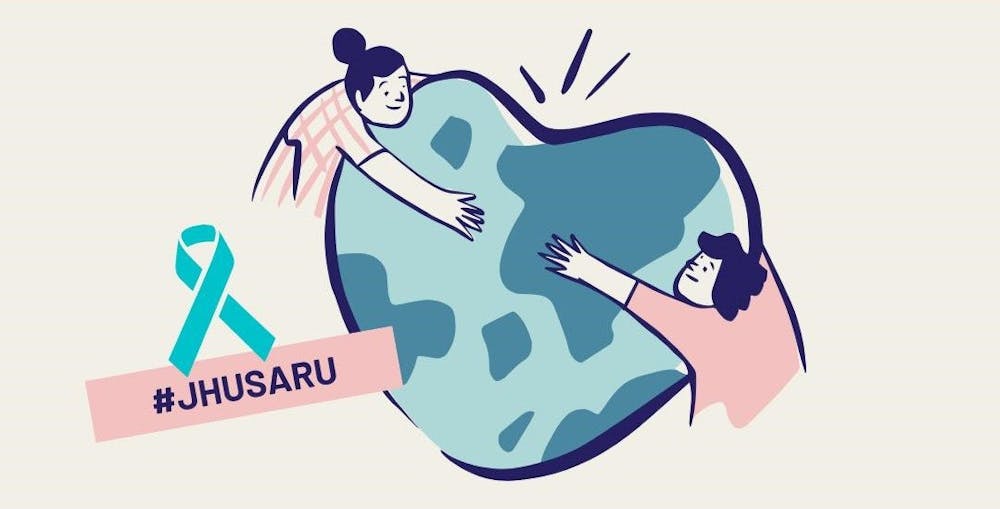Sexual Assault Awareness Month (SAAM), observed in April, is an annual campaign to educate the public on how to prevent sexual violence. For the Sexual Assault Resource Unit (SARU), a student group that seeks to dismantle rape culture and support survivors of sexual violence, SAAM is an important opportunity to educate the student body.
SARU has expanded its social media presence this month, spreading messages about consent — stating that it is enthusiastic, specific and can be taken away and communicated through body language.
SARU Co-Director Reah Vasilakopoulos, a senior, explained that the organization has had to think creatively about transitioning to an online platform. Following the cancellation of in-person classes through the end of the spring semester due to the ongoing coronavirus (COVID-19) outbreak, SARU and other student groups have been forced to adapt their practices.
Junior Padmini Balaji, SARU’s events co-chair, highlighted the group’s efforts in an interview with The News-Letter.
“We’re working to ensure that survivors feel supported at this time by keeping active on social media, keeping our hotline active and offering different opportunities to maintain community and be involved,” she said.
Next week, in collaboration with the Student Government Association (SGA), SARU will host a series of virtual events promoting consent culture, body positivity and conversations surrounding sexual violence.
Last month, Senior Class Senator Chanel Lee and Junior Class Senator Addy Perlman introduced a bill to fund events for Sex Week, including an examination of consent in movies and a kink workshop led by a dominatrix.
In an email to The News-Letter, Lee voiced their disappointment that the initiative cannot be held in person, while noting the potential benefits of moving it online.
“We were hoping to have face-to-face interaction and give out a lot of sexual health resources to students. But hopefully by moving everything online, we are making the events more accessible and approachable to students. Students who may have felt too shy or nervous about participating in-person can do so without having to physically be present,” they wrote. “It is critical that we are lowering as many barriers of entry as possible and offering safe and meaningful opportunities to have these potentially very sensitive conversations.”
SARU is advertising a series of webinars and workshops, Balaji said, for survivors and allies who may be feeling increasingly isolated or anxious because of social distancing guidelines and shelter-in-place orders caused by COVID-19. The series is hosted by End Rape on Campus and It’s On Us, two campaigns fighting against sexual violence on college campuses.
Vasilakopoulos emphasized that, amid the pandemic, being there for survivors of sexual violence is especially important.
“Having endless time to overthink, to be away from your therapist, to be away from your friend who you lean on a lot, from your significant other or even from your daily routine that keeps you grounded is all part of how people can get triggered,” she said. “We know that there are some students who are going back to households that their perpetrators live in. We know that there are some students who are losing their support networks and being uprooted in their healing process... Being in a space that’s associated with your childhood and with growing up is not as safe as some people might feel it is.”
Senior Madelynn Wellons expressed her appreciation for SARU’s efforts.
“Being involved in this work on campus and having it impact me personally, I’ve seen how crucial SARU’s work is and how important the impact is,” she said. “I’m really glad to see it continuing despite the horrific circumstances we’re under.”
In December 2018, Wellons, then a junior class senator, passed the Title IX Policy Resolution calling for the University to reform the Office of Institutional Equity (OIE) and reduce the average duration of an investigation. Wellons told the University she was sexually assaulted on Homewood Campus in 2016. It took OIE a year and a half to complete its investigation. The Title IX federal standard is 60 days.
University President Ronald J. Daniels told The News-Letter this December that over the past two years, Hopkins has responded to student feedback in order to improve OIE’s efficiency and practices. OIE’s budget and staff, Daniels said, have both more than doubled since 2015.
According to Vasilakopoulos, OIE has informed members of SARU’s executive board that it is still conducting investigations and figuring out ways to best support students reporting trauma.
SARU has scheduled a meeting with Dean of Student Life Smita Ruzicka, Vasilakopoulos added, to ensure that administrators continue to work toward preventing and responding to sexual violence throughout both Sexual Assault Awareness Month and the rest of the semester.
Vasilakopoulos underscored SARU’s commitment to supporting survivors.
“There are two different camps of people who are very likely struggling right now: those for whom home is not a safe place and they’re at home, and those for whom being on campus is not safe and they’re stuck around campus, isolated by themselves,” she said. “It’s hard to imagine tangible ways to support people right now because we can’t be there in physical person, so we’re all working on being creative, trying to do video chats and checking in on people more often than we normally would.”
Lee stressed their optimism for SARU and SGA’s upcoming programming.
“The entire Sex Week committee is super excited for this event,” they wrote. “Many other universities have had sex weeks in the past, and I really see this as a valuable event that SGA and SARU can continue to put on for years to come at Hopkins.”
For crisis support and resource connections, call SARU’s confidential 24/7 peer-run hotline at (410) 516-7887.





